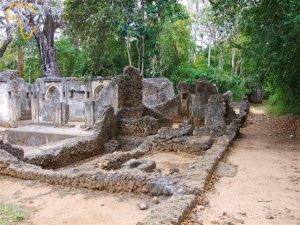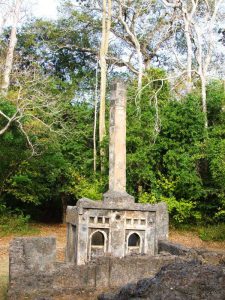The Historic Town and Archaeological Site of Gedi Designated as Kenya’s 8th World Heritage Site
Nairobi, Kenya – 27th July 2024 – The National Museums of Kenya is proud to announce that The Historic Town and Archaeological Site of Gedi has been officially inscribed on the UNESCO World Heritage Sites list, becoming Kenya’s eighth World Heritage Site. This prestigious recognition underscores the historical and cultural significance of Gedi, solidifying its place as a vital part of Kenya’s rich heritage.
Located in the heart of Kenya’s coastal region, the Historic Town and Archaeological Site of Gedi is a testament to the Swahili culture that thrived from the 13th to 17th centuries. The ruins of Gedi include a series of stone houses, a palace, and a mosque, all nestled within lush indigenous forest, creating a unique blend of natural and cultural heritage. The site reflects the rich history and sophisticated architecture of the Swahili civilization, marked by its well-planned urban layout and intricate coral stone structures.
The inscription of Gedi underscores NMK’s commitment to playing its rightful role in conserving and promoting Kenya’s heritage for posterity. “We thank the NMK Team that led the process and all our partners who provided either financial support or guidance that helped in the process,” said the Director of Antiquities, Sites and Monuments, Dr Fredrick Manthi.
The core team that prepared the Dossier included Dr Purity Kiura, Dr. Emmanuel Ndiema, Hosea Wanderi, Mohammed Mwenje, Ceasar Bita, Khalfan Bini, Saadu Rashid, Dennis Milewa, Doris Kamuye, Jimbi Katana, Jambo Haro, Mbarak, Stephen Okoko, Hussein Aden, and Dr. Fredrick Manthi. We also had support of lead consultant Prof. George Abungu who is a former Director General of the National Museums of Kenya with support from Prof Chapurukha Kusimba, and the Zamani project of South Africa.
“We are deeply honoured by this inscription, which highlights the importance of preserving and promoting our cultural heritage,” said Prof. Mary Gikungu, Director-General of the National Museums of Kenya. “The recognition of Gedi as a World Heritage Site not only elevates its status on a global stage but also reaffirms our commitment to safeguarding our national treasures for future generations.”
The inscription of the Historic Town and Archaeological Site of Gedi follows rigorous evaluation and endorsement by the World Heritage Committee, which acknowledged the site’s outstanding universal value. This designation brings a renewed focus on conservation efforts and opens new opportunities for sustainable tourism, research, and international cooperation.
The National Museums of Kenya, in collaboration with local communities and international partners, will continue to implement robust conservation measures to protect Gedi’s archaeological and biological integrity. Additionally, efforts will be made to enhance visitor experiences through improved infrastructure, educational programs, and community engagement initiatives.
Kenya now proudly hosts eight World Heritage Sites, Lake Turkana National Parks, Mount Kenya National Park and Forests, Lamu Old Town, Sacred Mijikenda Kaya Forests, Fort Jesus, Mombasa, Kenya Lake System in the Great Rift Valley, Thimlich Ohinga Archaeological Site, and now the Historic Town and Archaeological Site of Gedi offering a unique glimpse into the nation’s diverse cultural and natural heritage. The addition of the Historic Town and Archaeological Site of Gedi to this illustrious list not only enhances Kenya’s cultural landscape but also contributes to the global understanding of Swahili culture and history.
We invite everyone to join us in celebrating this monumental achievement and to visit Gedi Historical Site to experience first-hand the magnificence of this newly recognised World Heritage Site.
For more information, please contact:
The Curator,
Gede Museums,
P.O.Box 5067, 80208 GEDE.
Email: gede@museums.or.ke
Tel: 042- 32065.


